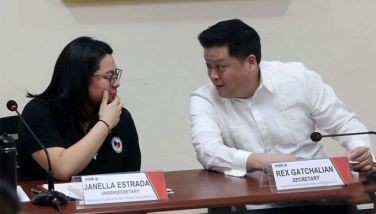EU, SEA bare 80-billion-euro science program
SINGAPORE – The European Union (EU) is set to spend €80 billion (over P4.5 trillion) for research and innovation from 2014 to 2020 to expand scientific collaboration between Europe and Southeast Asia and find solutions to global societal challenges such as climate change.
Máire Geoghegan-Quinn, EU commissioner for research, innovation and science, said the EU will launch a new program for research and innovation in 2014, dubbed “Horizon 2020,” which will benefit developing countries like the Philippines with low public spending on research and development.
“The Horizon 2020 program will offer many new opportunities for ASEAN researchers to work with their European counterparts,” Quinn said in a speech at the Nanyang Technological University on Saturday.
Quinn’s visit to Singapore was part of this year’s celebration of the “ASEAN-EU Year of Science, Technology and Innovation.”
The Singaporean government has committed to spend S$16.1 billion from 2011 to 2015 on research, innovation and enterprise.
The Philippines, however, ranked 54 in research and development spent $123 million or 0.1 percent of gross domestic product (GDP) based on the 2009 World Competitiveness report. This is half the amount of Thailand (0.2 percent GDP, $498 million).
“Horizon 2020 will offer European and Asian scientists, researchers and innovators many opportunities to work together, to make the discoveries and breakthroughs that will improve our economies and our day to day lives,” Quinn said.
She said under the new program, nearly €32 billion (more than P1.8 trillion) will be allocated for researches focusing on the following societal challenges: health, demographic, change and wellbeing, food security, sustainable agriculture, marine research and the bio-economy, clean energy, green and integrated transport, and climate change, among others.
“In an ever more interconnected world, scientific breakthroughs or the innovative applications of new technologies rarely come about by working in isolation,” Quinn said.
“ASEAN and EU have similar policy target specifically in the promotion of renewable energy, the protection of marine resources and development of ICT,” Quinn said.
She said ASEAN participation in the EU’s Seventh Framework Program for Research and Technological Development (FP7), the biggest international research program worldwide, “is significant.”
The Association of Southeast Asian Nations (ASEAN) is composed of Cambodia, Indonesia, Lao PDR, Malaysia, the Philippines, Myanmar, Singapore, Thailand, Vietnam and Brunei.
She said a total of 147 research organizations from ASEAN participated in grant agreements in the FP7, an increase from 121 in the FP6.
“However, a division into two groups can be observed. While Brunei, Cambodia, Laos, and Myanmar have low participation rates, Thailand, Vietnam, Indonesia, Malaysia, Philippines and Singapore feature higher participation rate. Thailand has highest activities among ASEAN countries followed by Indonesia and Vietnam,” Quinn noted.
“This year we will have the last call for FP7 proposals worth €10 billion. The program will come to an end by 2013 and will be replaced by the new research program called Horizon 2020,” she said.
She said Thailand is doing well in the field of agricultural biotechnology while Malaysia is performing well in nanotechnology.
Vietnam, meanwhile, is among the top performers in the FP7 projects in the areas of energy, environment, health, agriculture and biotechnology, Quinn said.
Jean-Michel Sers, policy officer at the EU’s International Cooperation Policy, said ASEAN could adopt the EU mechanism that provides incentives to countries involved in scientific collaboration with other research groups in the region.
“In this way, duplication of researches in similar areas and competition for research funding can be avoided,” Sers said.
The ASEAN-EU research collaboration program also aims to address the lack of scientists and adequate research infrastructure in some developing countries, Quinn said.
Sen. Edgardo Angara, chair the Senate committee on science and technology, has urged the Aquino administration to allocate at least P322 million in dedicated funding for innovation clusters, underscoring the importance of increasing government funding to build the country’s capacity to innovate for development.
“The United Nations Educational, Scientific and Cultural Organization (UNESCO) recommends that we spend at least one percent of the country’s total GDP on research and development (R&D),” Angara said.
2012: Year of Science, Technology and Innovation
Sers said the ASEAN-EU Year of Science, Technology and Innovation 2012 (YoSTI) aims to strengthen the political dialogue between the two regions. It aims to increase awareness, especially among young scientists, of the importance of Southeast Asian-European cooperation in the field of science and technology.
“STI (science, technology and innovation) could also be at the top of the agenda for the 19th EU-ASEAN Ministerial Meeting which will take place in Brunei in April 2012,” Angara said.
As part of the YoSTI celebration, the EU-funded Regional EU-ASEAN Dialogue Instrument (READI) has sponsored the two-day visit of ASEAN and European journalists to Singapore, which has now become the leading research hub in Asia.
Sers said the journalists’ visit was aimed at facilitating the exchange of ideas, experiences and best practices in science communication.
READI was created to support cooperation and policy coordination between ASEAN and EU in all non-trade related sectors.
- Latest
- Trending
































